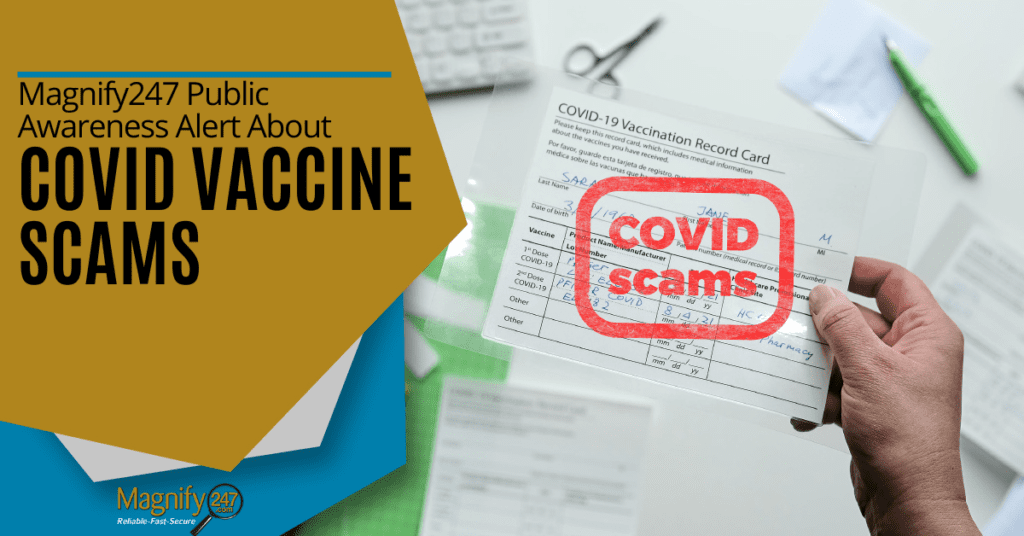Using bogus surveys, texts purporting to be from a health agency, and social media posts, cybercriminals are crafting scams to target a new audience as more COVID-19 vaccines are being administered. In this week’s security tip video, learn the new trends in vaccine scams and why you should avoid posting pictures of your vaccination card.
watch a short video > https://youtu.be/yR_js2HuUxs
Your personal cybersecurity starts with awareness of the threats that are out there and taking precautions to protect your information. Phishing scams come in all forms – email, phone, social media, SMS – so you need to be prepared so you’re not fooled by these sophisticated setups.
Many scammers put up elaborate phishing sites that look just like the real thing, all to fool you into revealing sensitive information, giving up your password, or downloading malware onto your computer.
Cybercrime has skyrocketed 300%+ since the pandemic began, as criminals try every ploy that they can to get their hands on your data and/or your money.
Here are some of the most recent COVID-19 scams to be on the alert for so you’re not taken in.
Text Message Scam
In this scam, the recipient receives an SMS or email that appears to be from the NHS (National Health Service) that asks them to confirm their recent COVID-19 vaccine shot and provides the date that the person got the vaccination. It provides a link that appears to be to the NHS website but is actually going to a phishing site.
Not all links are what they appear to be. It’s important to hover over links before you click to see the true URL and use a DNS filter that can detect and block malicious websites.
Scam Surveys/Evaluations
COVID survey scams are rampant by email, social media, and phone. The scammer claims to be from a health agency or drug company conducting a survey or post-vaccine evaluation.
Some of the details that scammers may request are a person’s credit card number, social security number, or other sensitive information that can be sold on the Dark Web.
Key signs of a scam like this are:
- If the surveyor asks for highly confidential information
- The surveyor asks for financial information
- You’re offered gifts or prizes for your participation
- You’re asked for a Medicare number
Why You Shouldn’t Post a Photo of Your Vaccination Card
If you’ve taken a selfie with your vaccination card, consider removing it from social media.
This information might seem innocent enough, but it provides scammers with details that can help them perpetrate a phishing attack against you or someone you know.
There have been recent reports of images of vaccination cards going up for sale on the Dark Web. With even this little bit of information that’s included on a vaccine card, a scammer can commit identity theft or plan a more involved attack. Such as the phone scam where the caller knows your last vaccination date, thus you or a family member think the call is legitimate.
Legitimate Agencies Aren’t Offering to Sell a Vaccine Card
Another scam that uses posted images of a vaccination card is to use that card image to create fake COVID-19 vaccination cards that are sold online to those that don’t want to get a vaccine but might need proof of vaccination for work. According to HHS.gov, valid proof of vaccination can only be provided to individuals by legitimate providers that are administering the vaccine.
Scammers Asking to Pay for a Spot in Line
One scam that happened over the social media dating app Bumble involved a seemingly “nice” person that a woman had been chatting with. The person mentioned getting vaccinated and when the woman noted she was also interested in getting the vaccine, the scammer said she should pay him for a “spot in line” so she wouldn’t have to wait.
This is a scam. Providers that are administering the vaccine aren’t charging people to get a spot in line to get it.
Offers to Ship the Vaccine to Your Door
Any online ads, emails, or social media posts you see advertising the vaccine for purchase and shipping to your door are another COVID scam.
You should also be wary of anyone trying to sell you a vaccine that is shipped to your house. The vaccines have to be administered by medical personnel and stored in strict temperature-controlled conditions. They’re not being sold online to the general public.
Additionally, the vaccine is free to all Americans, there is no charge to get it, so avoid anyone asking you to pay for it.
Is Your PC Protected from Scammers & Phishing Sites?
There are certain protections you can put on your PC, such as antivirus and DNS filtering that can help you reduce your risk of becoming a scam victim. Magnify247 can help your Hamilton County home or business with the details.
Contact us today to learn more!







